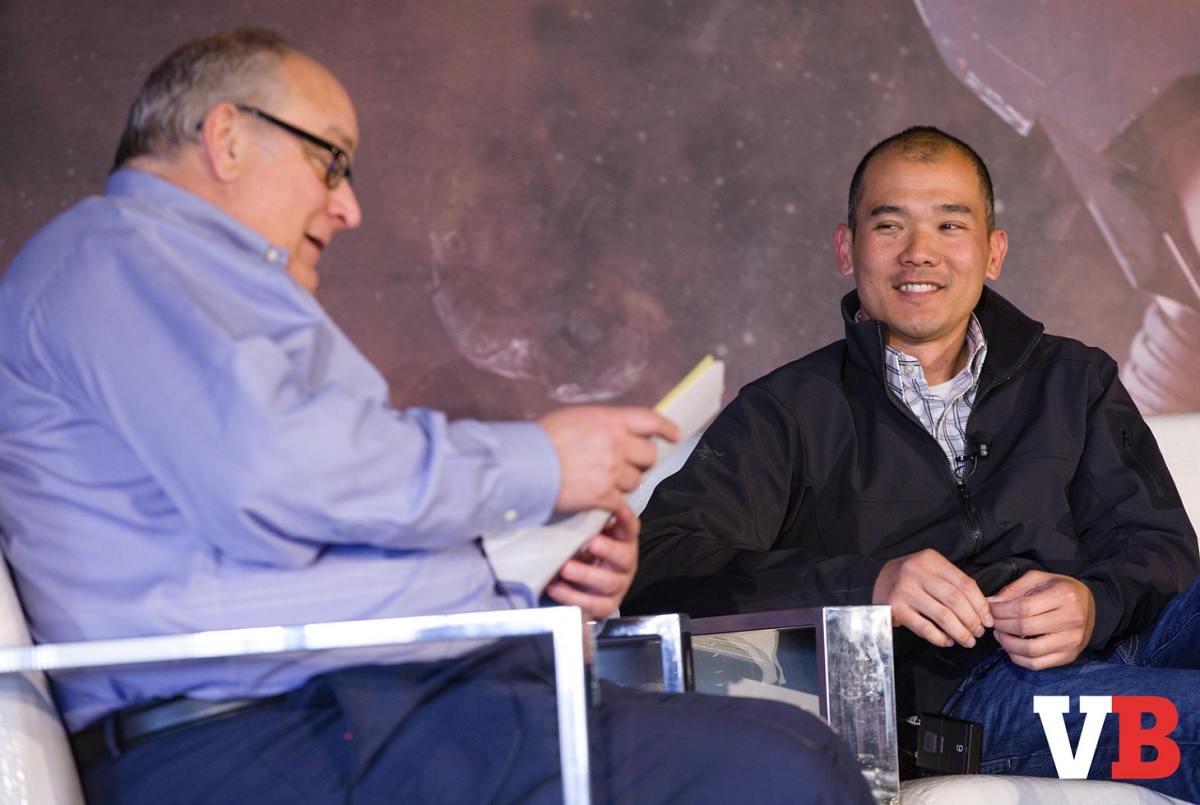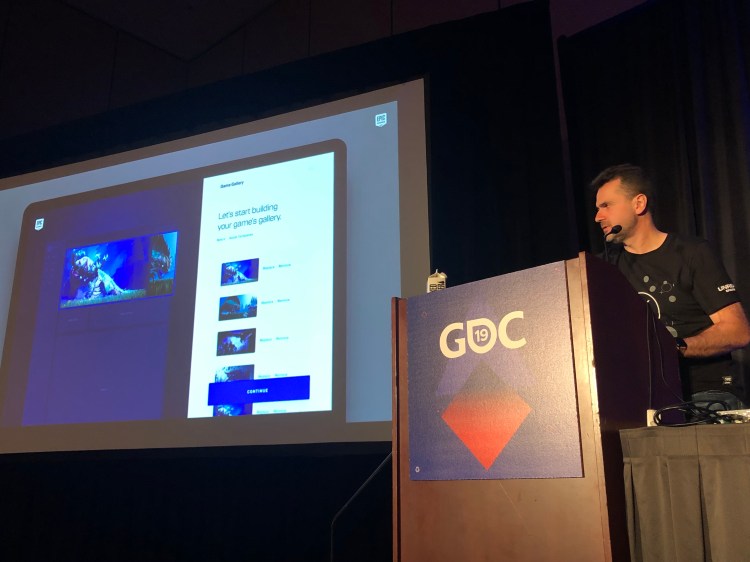The Epic Games Store is gaining momentum with PC developers. But even with its popularity (due to its 88 percent revenue share model), some still have questions about how Epic Games plans to stay competitive against Steam and whether it’ll expand into other markets.
At the 2019 Game Developers Conference in San Francisco last week, the company hosted a Q&A session to address those concerns, as well as to talk to the community about the state of the store. Currently, the Epic Games Store has 85 million players, with each person owning an average of three games (though Epic said that’s partly because of all the free games it’s been giving away). Over 55,000 influencers are part of its Support-A-Creator program, where video creators and streamers get paid for convincing viewers to download games in the store.
Director of publishing strategy Sergey Galyonkin said that while it varies from game to game, up to 25 percent of sales are coming directly from these influencers and their audiences. But he believes that number will dramatically increase as they add more games and improve the store and its tools. Epic is also working on adding user reviews (developers can choose whether to opt-in or not), modding support, and cloud saves. A full roadmap can be found on its public Trello board.
Handling mature games
Toward the end of his short presentation, Galyonkin promised developers that the store will open up to more games by the end of 2019 (currently, Epic sets up each game manually). But he also echoed CEO Tim Sweeney’s comments from earlier in the week, when Sweeney told PC Gamer that the Epic Games Store will never sell “porn games or bloatware or asset flips.”
“We do not intend to sell porn or hate games on the store. But other than that, we do not intend to censor your titles. We will not judge them on the artistic merits, just on the quality merits,” said Galyonkin.
The topic of curation came up again later in the Q&A portion, when someone asked the team whether they’d consider selling visual novels — which Valve has also struggled with — in the future. Galyonkin said that as long as these games have the equivalent of the ESRB’s “Mature” rating, then it’s OK, but that anything higher than that (such as the rarely used “Adults Only” rating) is a no. However, head of Epic Games Store Steve Allison offered a more nuanced statement.
“If we’re in the business of [selling] visual novels at the Epic Games Store — it could happen. … If they don’t have a rating that we can reflect on, that they went through a process on, then we’ll have to make subjective judgments on stuff like that,” Allison said.
As it stands, Epic’s policy is much more direct and explicit than Valve’s approach to curation. In the past, Steam has been roundly criticized for allowing hateful and despicable content on its digital distribution service.

Above: Mike Vorhaus of Magid Advisors talks with Randy Lee of Tencent.
China and the perceived threat of Tencent
One person asked the panel why the Epic Games Store isn’t available in China yet. While the gaming industry there is worth $30 billion, the Chinese government is incredibly strict about what kind of games — especially games from foreign developers — can be legally sold in the country. Allison alluded to those challenges in his answer, adding that Epic’s office in China makes it a more precarious situation for them.
“That’s a complicated question. … The way our competitor operates offshore is not legal in China, and they don’t have an office in China. We have employees there, so we are very sensitive to what is legal and what is is not — more for the benefit and safety of our staff. We just don’t want to take any risks that can put them in any legal fire,” said Allison.
Another developer, who was clearly frustrated at the stalled development of the Unreal Tournament reboot, asked if Epic Games investor Tencent had anything to do with that decision. The Chinese conglomerate (and frequent investor of gaming companies) owns about 40 percent of Epic.
“Tencent has zero input into our business. They do not talk to us about what we’re doing. They don’t suggest what we should be doing. They don’t make any decisions for us. They’re not in our building,” said Allison. “Everything we do is with our team, and the final point of conversation when it goes up to the top is Tim [Sweeney], and Tim does not take any orders from Tencent, believe me.”
Just to make sure, the same developer asked if Tencent has anything to do with the Epic Games Store. The answer, once again, was no.
The exclusive-spree won’t last forever
One way the Epic Games Store has been building momentum is by signing exclusive deals with some of the top developers in the world, such as Remedy (Control), Supergiant Games (the early access RPG Hades), and Ubisoft (The Division 2). But for some developers, the exclusivity has become a concern — after all, it’s in their best interests to release their games on as many platforms as possible. So someone in the audience asked Epic if they plan to rely on exclusive games in the long term to lure people in, or if that’ll eventually subside.
Allison noted that while he doesn’t think they’ll be signing exclusive deals forever, it’s something they’ll keep doing for the foreseeable future.
“We’re already seeing the ecosystem come to life from a sales and user perspective. [We’d] probably do it for a while because it’s about pushing the business model and helping people thrive,” he said. “But at some point, hopefully people just come [to the store], or the industry moves down and matches us. … At some point, we could go to zero, or we could go to very, very few major exclusives in any given year. We’ll definitely not be doing them at the scale we’re doing now, not for an extended period of time.”

Above: The Aurora train is your ticket to the east in Metro Exodus.
Responding to the Metro Exodus backlash
One PC exclusive in particular, the dystopian shooter Metro Exodus, rubbed the community the wrong way. Metro Exodus jumped to the Epic Games Store just weeks before its February launch, angering people who’d already preordered or planned to purchase the game on Steam. While it did well, with Epic saying sales were 2.5 times better than what the previous game (Metro Last Light) did on Steam in 2013, the last-minute move was a rare and awkward misstep for the fledging storefront.
A developer asked how they’d handle something like this going forward.
“We knew there was gonna be some pushback there. It wasn’t an ideal solution. We definitely want to avoid that in the future,” said head of business development Joe Kreiner.
Allison agreed, and promised to work with gaming companies to make sure these important decisions happen much earlier in the process.
“We’d been talking to [Metro Exodus publisher Deep Silver] for a number of months. They made some decisions on their end — this is not a throw-them-under-the-bus thing — it’s just the timing of when that came together and what was important to their business,” he said. “We decided to do it together. We both knew there was the potential for the thing that happened in terms of communication.
“It felt way worse and was bigger than we thought. We spent time talking about it, [that] we’d never do this again in this way.”

